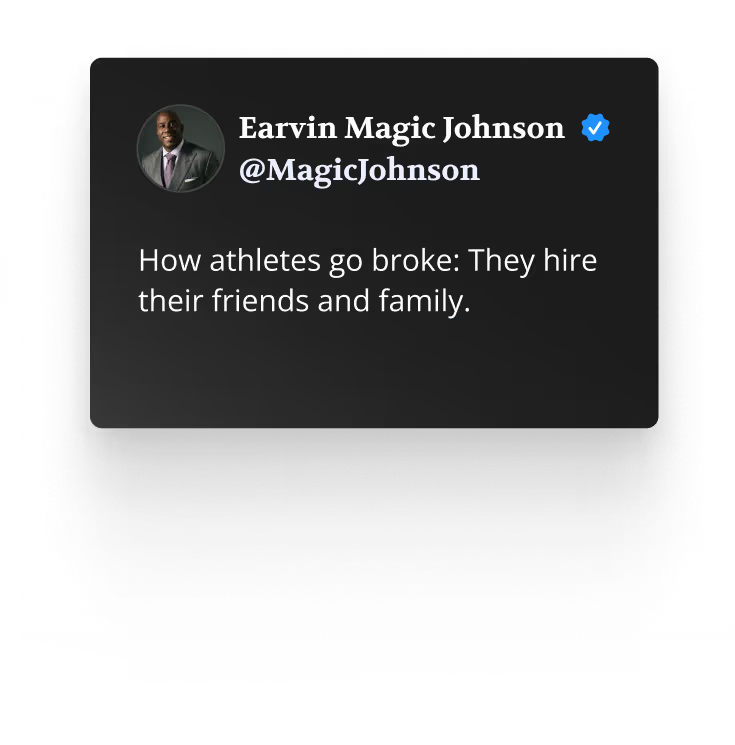Build generational wealth with the Athlete Family Office.
At AWM Capital, we specialize in a human-centered approach to managing wealth for professional athlete families. Our mission is to create wealthy, flourishing families for generations to come.



For your elite athlete family.
Thank you! Your submission has been received!
Oops! Something went wrong while submitting the form.

Featured Advisor
Sam Acho
9 yr NFL Veteran, Former Vice-President NFLPA, ESPN Analyst
Financial Management
Continue your success—for generations.
Your legacy isn’t just about the wealth you’ve built—it’s about the life you’ve created for your family and the impact you’ll leave behind. We work with you to align your financial strategies with your family’s values and goals, ensuring that your legacy lasts for generations.

Family Office
Every team has a Front Office. Every family needs a Family Office. We run the business of your family which never ends and is never finished. A family office is a comprehensive service designed to manage every aspect of your financial and personal life. Think of it as having an all-in-one team for wealth, business, and family needs—working together seamlessly for you.
Ventures
Investing in the trailblazers, changemakers, and luminaries that are building generational companies so that you can build your multi-generational family wealth.
Success Stories
From one Pro to another.
This is our sport. As former athletes we leveraged what we know it takes to become elite and built the only Family Office dedicated to professional athletes.
82
First round picks
as of February 2025
203
Kids in training
$3.33B
Total net-worth stewarded
as of December 21, 2024
97
Philanthropy projects

“The team at AWM knows how to care for people as much as they do their finances.”
Sam Acho
Director of Human Capital and Impact
9 Year NFL Veteran, Former Vice-President NFLPA, ESPN Analyst

“The AWM Way helps create a framework
for athletes to achieve true success.”
for athletes to achieve true success.”
Aaron Goldberg, CFP®, CPWA®, CIPM
Senior Wealth Advisor
Former professional golfer

“A human-centered approach ensures we
focus on what matters most—the needs of your family.”
focus on what matters most—the needs of your family.”
Zach Miller, CFP®
Private Wealth Advisor
Superbowl Champion, 8 year NFL Veteran, Former NFLPA Player Rep.

“Building trust with long-term relationships is one of the most important things we do.”
Travis Chick, CFP®, CPWA®, AEP
Senior Private Wealth Advisor
Former MLB Pitcher
Sam Acho

“The team at AWM knows how to care for
people as much as they do their finances.”
people as much as they do their finances.”
Sam Acho
Director of Human Capital and Impact
Former NFL linebacker with Cardinals, Bears, Bills, and Buccaneers
Aaron Goldberg

“The AWM Way helps create a framework
for athletes to achieve true success.”
for athletes to achieve true success.”
Aaron Goldberg, CFP®, CPWA®, CIPM
Partner
Former professional golfer
Zach Miller

“A human-centered approach ensures we
focus on what matters most—the needs of your family.”
focus on what matters most—the needs of your family.”
Zach Miller, CFP®
Private wealth advisor
Former NFL Tight End with Seahawks and Raiders
Travis Chick

“Building trust with long-term relationships is one of the most important things we do.”
Travis Chick, CFP®, CPWA®, AEP
Senior Private Wealth Advisor
Former MLB Pitcher





Pro Clients
We empower athletes to achieve more than just financial success.
Hear from pro athletes who have transformed their lives with AWM Capital. Our tailored services have helped them secure their financial futures and make a lasting impact.

Let’s do this
Ready to make the most of your wealth?
Get to know the team that can help you get the wins you need.















